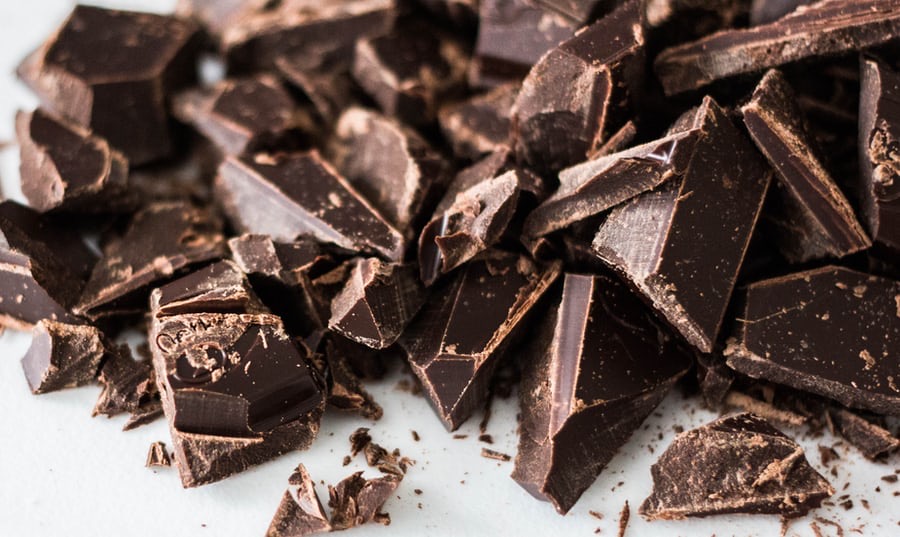Inflammation and oxidative stress are contributing factors to aging, cognitive decline, and neurodegenerative diseases like Alzheimer’s and Parkinson’s. If you’re experiencing memory loss, lack of concentration, or mood swings, you may want to start focusing on foods that offer you brainpower. Like your heart and gut health, your brain requires an array of nutrient-dense foods that promote proper blood flow. Give your brain a boost by choosing more anti-inflammatory and antioxidant-rich foods that can improve attention span and memory. Limiting alcohol, processed meats, packaged foods, and beverages high in saturated fat, sugar, and sodium will help reduce inflammation and stress within your brain. Along with a healthy eating plan, it’s also important to get enough sleep, hydration, and exercise each day for better brain health.

Nutrient-Dense Foods for Better Brainpower
Dark Chocolate and Cocoa. Although more studies are needed, Italian researchers believe that flavanol, a natural compound found in cocoa, may enhance brain function and protect it from cognitive decline. These researchers found that regular consumption of cocoa was especially beneficial to healthy individuals who were sleep-deprived. You may even improve your memory and mood with a daily dose of dark chocolate. Keep your serving to 1-1.5 ounces each day. Dark chocolate should contain at least 70% cocoa to achieve nutrient benefits.
Green Tea and Coffee. Caffeine offers an immediate boost in alertness and concentration, but it may also improve mood and reduce cognitive decline. Pass on the sweeteners and creamers and enjoy these antioxidant-rich beverages in their most natural state. Limiting caffeine intake to about 400 mg per day, which is equivalent to approximately 4 cups of coffee, is considered safe for adults but not recommended for children.
Nuts and Seeds. Almonds, walnuts, sesame, and chia seeds, are examples of nuts and seeds that are packed with omega-3 fatty acids and vitamin E. These nutrients can promote repair, preserve cognitive function, and help protect your brain from cell damage. Choose raw or dry roasted nuts, which are less processed and more nutritious. Scatter or spread 1.5 ounces serving of nuts or seeds throughout your day for optimal brainpower.
Salmon and Tuna. These examples of oily fish contain a significant amount of omega-3 fatty acids. Omega-3s contain anti-inflammatory properties that may be protective of your brain cells. Since your body is unable to make omega-3s on its own, incorporating them into your meal plan is essential. An imbalance of fatty acid intake has been linked to decreased brain performance and disease. A five-year 2016 study published in Neurology, found that older adults who ate at least one seafood meal a week performed better on cognitive tests than those who ate less. Although more research is necessary, dietary sources or supplementation of omega-3s should be consumed at adequate levels throughout life for better memory, comprehension, and also building and protecting nerve cells. The American Heart Association recommends two (3.5 ounces) servings of oily fish servings per week.
Broccoli, Kale, and Spinach. These green powerhouses provide an ample dose of brain-healthy vitamins E, K, and folate (B9). Vitamins E and K are fat-soluble vitamins, which means they can cross the blood-brain barrier. These vitamins have strong antioxidant capabilities that help protect brain cells (neurons) from oxidative stress. Vitamin K also helps regulate calcium in bones and the brain.
Folate plays an important role in helping the body reduce homocysteine levels. Folate deficiency and high homocysteine levels, together, have been proven to be an increased risk factor for cognitive decline, depression, and Alzheimer’s disease, especially in older adults according to the British Medical Journal.
Broccoli also provides choline, which is an essential nutrient made in your body. However, more choline needs to be provided from your diet. Adequate choline intake is crucial for memory and other cognitive abilities. If your folate intake is low, your choline needs increase because it performs the same role in several metabolic functions.
Turmeric. The golden-colored spice contains an anti-inflammatory chemical known as curcumin, which is loaded with antioxidants. Evidence suggests that turmeric may be beneficial to those experiencing depression and may even help boost memory. In a 2018 study published in the American Journal of Psychiatry, researchers found that the supplement Theracurmin (90 mg)-taken twice a day improved memory and attention in non-demented adults. Before taking a turmeric and curcumin supplement, always consult with your doctor because it may interact with certain drugs. Also, consuming large amounts of turmeric may cause gastrointestinal issues. Sprinkle turmeric in soups, salads, or on avocado toast, to add some anti-inflammatory benefits to your meals. Turmeric is better absorbed when accompanied by black pepper.
Blackberries, Blueberries, and Raspberries. Dark-colored berries are a great source of anthocyanins and flavanols. Their antioxidant and anti-inflammatory effects help decrease cell damage and promote repair. Anthocyanins have the ability to cross the blood-brain barrier and protect brain cells from aging. Many studies have demonstrated that berries have protective properties, especially from high-fat diets. Berries have also shown their ability to improve mood and reduce the risk of developing depression.


